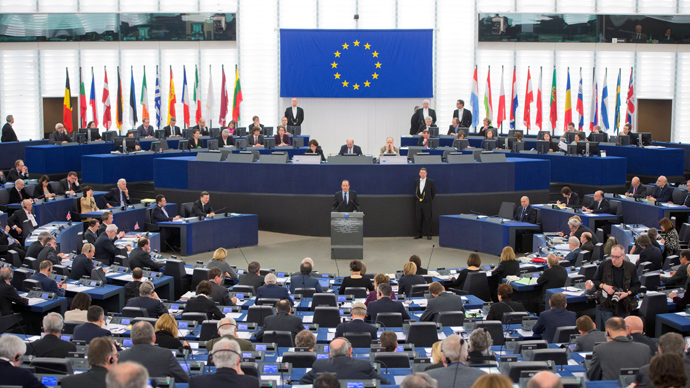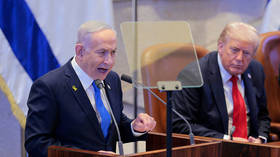EU demands ‘full clarification’ of NSA diplomat spying, warns of severe impact on relations

The president of the European parliament has demanded an explanation from US authorities over the latest revelation that EU diplomatic missions in Washington, New York and Brussels were under electronic surveillance from the NSA.
“I am deeply worried and shocked about the allegations of US
authorities spying on EU offices,” said the President of the
European Parliament Martin Schulz. “If the allegations prove
to be true, it would be an extremely serious matter which will
have a severe impact on EU-US relations.”
“On behalf of the European Parliament, I demand full
clarification and require further information speedily from the
US authorities with regard to these allegations," he added.
EU commissioner for justice, Viviane Reding, said the Union has
contacted the US authorities in Washington and Brussels about a
report in Der Spiegel magazine.
"We have immediately been in contact with the US authorities
in Washington DC and in Brussels and have confronted them with
the press reports," she said in a statement. "They have
told us they are checking on the accuracy of the information
released yesterday and will come back to us."
"Partners do not spy on each other,” Reding, suggesting that
talks for a free trade agreement between the EU and the US should
be halted until Washington provides explanations.
"We cannot negotiate over a big transatlantic market if there
is the slightest doubt that our partners are carrying out spying
activities on the offices of our negotiators," she said.
Reding’s stance was backed by the European Parliament's foreign
affairs committee head, Elmar Brok.
"The spying has taken on dimensions that I would never have
thought possible from a democratic state," he told Der
Spiegel. "How should we still negotiate if we must fear that
our negotiating position is being listened to beforehand?"
Germany and France want answers
Meanwhile, Germany's justice minister also called for an
immediate explanation from the United States saying the news that
Washington bugged European Union offices was "reminiscent of
the Cold War."
"It must ultimately be immediately and extensively explained
by the American side whether media reports about completely
disproportionate tapping measures by the US in the EU are
accurate or not," Sabine Leutheusser-Schnarrenberger said in
a statement.
It was also revealed on Sunday that the extent of NSA’s spying on Germany was bigger that
previously thought as the US combed through half a billion German
phone calls, emails and text messages every month.

France also wants Washington to clarify their intentions after
the news that the NSA put EU offices under electronic
surveillance.
"France has today asked the American authorities for an
explanation," Laurent Fabius, French foreign minister, said
in a statement. "These acts, if confirmed, would be completely
unacceptable."
"We expect the American authorities to answer the legitimate
concerns raised by these press revelations as quickly as
possible," he added.
The US has refused to comment publicly on the Der Spiegel story,
saying it will discuss EU spying charges through diplomatic
channels.
"We will also discuss these issues bilaterally with EU member
states," a spokesperson from the Office of the Director of
National Intelligence said. "While we are not going to comment
publicly on specific alleged intelligence activities, as a matter
of policy we have made clear that the United States gathers
foreign intelligence of the type gathered by all nations."
Der Spiegel, quoting from a September 2010 "top secret" US
National Security Agency (NSA) document leaked by former CIA
employee Edward Snowden, reported on Saturday the NSA was
eavesdropping on the EU’s internal computer networks in
Washington, as well as at the 28-member bloc UN office in New
York.
The German magazine also reported that five years ago, the NSA
also targeted telecommunications at the Justus Lipsius building
in Brussels, home to the European Council, where all EU member
states have their offices.

Snowden, 30, fled the US for Hong Kong in May, just weeks before
The Guardian and Washington Post published details he provided
about a top-secret US government surveillance program that
accumulated internet and telephone traffic both at home and
abroad.
The whistleblower is presently in the transit zone of Moscow’s
Sheremetyevo Airport, where it is believed he is attempting to
gain political asylum in Ecuador.
Lode Vanoost, former deputy speaker of the Belgian parliament,
believes that the main purpose of the US surveillance program was
“economic spying” on the EU.
“At the moment, the EU is negotiating a new free trade agreement
with the United States,” the former deputy speaker noted.
“Well, [now the US can gather] what their opponent is already
discussing internally of strategy. That is one of the
possibilities.”
Vanoost also believes that part of the reason for the spying was
due to the decline in US economic strength.
“On the economic level, [the US] is losing ground
everywhere,” he said. “Look at what the BRIC countries are
doing. The EU is having stronger ties with Russia, with Africa,
with Latin America. And the US doesn’t seem to get its economic
priorities imposed as it used to. So what I see is a big risk for
economic spying.”
He added that there is “too much at stake” for there to be
a total breakdown in US-EU bilateral relations, however,
“behind closed doors there will be some very tough words”
exchanged between EU and American officials.














